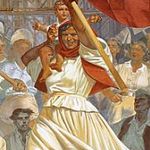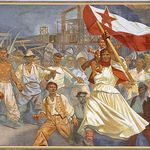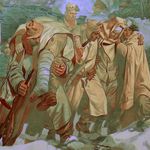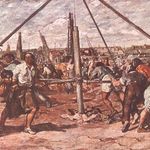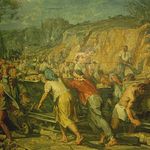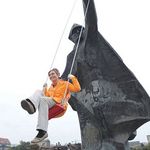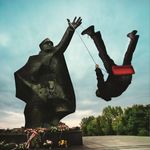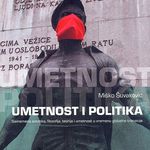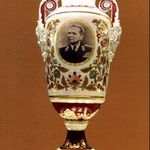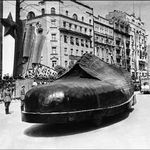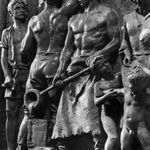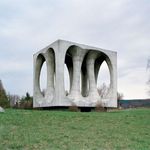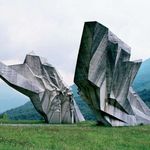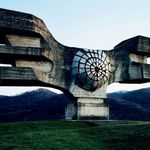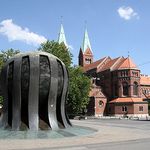Socialist Art Symposium
OUR HEROES, Socialist Art between Ideology and Identity
Friday, 13 December 2013, at 11:00-19:00
Maribor Art Gallery, Strossmayerjeva 6
speakers: Prof. Dr. Lev Kreft (SLO); Prof. Dr. Božidar Jezernik (SLO); Prof. Dr. Lidija Merenik (SRB); Donovan Pavlinec (SLO); Prof. Dr. Milanka Todić (SRB); Tihana Pupovac (CRO); Breda Kolar Sluga (SLO); Kamila Szejnoch (PL); Prof. Dr. Miško Šuvaković (SRB)
moderator: Simona Vidmar, UGM curator
The symposium Our Heroes at the Maribor Art Gallery focuses on the (still) controversial area of the socialist art legacy in Slovenia and in the former Yugoslavia. During the full-day event, nine experts on art, history and philosophy from Slovenia, Croatia and Serbia will attempt to outline this ideology burdened art field in order to open new possibilities of further research and establishment of a new dialogue.
Two major phenomena will be discussed: a short and little known era of post-war socialist realism with the idea of total aesthetisation of the world by artists in the role of engineers of human souls; and a megalomaniac project of monuments dedicated to the national liberation struggle throughout Yugoslavia by using the binding language of high modernism, a project that reformed the existing ideas of monuments and changed the cities. The two periods were marked by art in the time of ideology. We shall try to answer questions such as: How can a political dictate enter the field of art? How can a nation’s identity be (re)formed through the prism of art? What is the role of politics in art today? To paraphrase a letter by the Irwin group to Ješa Denegri from the 1980s: socialist art is a thing of the past, which means that the present requires a special, distance(d) approach.
The symposium moderator: Simona Vidmar, UGM curator
PROGRAMME:
11:00-12:00
KEYNOTE SPEAKER: Prof. dr. Lev Kreft (SLO), Totalitarianism and Art
12:00-12:30
Prof. dr. Božidar Jezernik (SLO), On the Development of the Slovenian National Question
(12:30-13:00 break)
13:00-13:30
Prof. dr. Lidija Merenik (SRB), Socialist Realism and Creation of a New Society - Two Paintings by Božo Ilić from 1948
13:30-14:00
Donovan Pavlinec (SLO), Slovenian Engineers of Human Souls?
14:00-14:30
Prof. dr. Milanka Todić (SRB), Photography and Propaganda 1945-1958
(14:30-15:00 break)
15:00-15:30
Tihana Pupovac (HRV), Monuments in Transition
15:30-16:00
Breda Kolar Sluga (SLO), Kojak or a Monument that Changed the City
16:00-16:30
Kamila Szejnoch (PL), How to Disarm a Monument?
(16:30-17:00 break)
17:00-18:00
THE CLOSING LECTURE: Prof. dr. Miško Šuvaković (SRB), Art and Politics
18:00-19:00
Closing debate
Lectures will be in Slovene, Serbian, Croatian and English.
FREE ENTRY!
LECTURES and SPEAKERS:
Prof. dr. Lev Kreft (SLO), Totalitarianism and Art
In the lecture Totalitarianism and Art three aspects will be addressed. First, the idea of totalitarianism will be presented and questioned by analysing its history as well as on the basis of a critical theory of Fascism/Nazism and the Soviet Communism. Next, totalitarian political ideas in art will be presented, particularly Nazism and Stalinism, as well as the common features of totalitarian politics in art: orientation to aesthetic organisation of crowds and manipulation of affects. The third part of the lecture will focus on the issue of artistic resistance to totalitarian politics.
Lev Kreft holds a PhD and is Professor of Aesthetics at the Faculty of Arts of the University of Ljubljana. He has published extensively on aesthetics and is the author of several books (Struggle on the Artistic Left Between Two World Wars, 1989; Aesthetics and Mission, 1994) and articles (the Filozofski vestnik, Teorija in praksa, Anthropos, Maska, Borec and in scientific publications in Poland, Hungary, Germany, Greece, Czech Republic, Portugal, Turkey, South Korea, Serbia, Bosnia and Herzegovina, Croatia and elsewhere). He has often lectured abroad, and in 2000 he was a Senior Research Fellow at the Centre for the Study of Democracy (director John Keane, the University of Westminster, London). In his political (member of parliament 1990-1992 and 1993-1996, Deputy Speaker of the Slovenian Parliament 1993-1996), public and professional activities he has been engaged in minority rights, the politics of equal opportunities, alternative culture and cultural politics, the politics of refugee protection and other issues concerning human rights.
Prof. dr. Božidar Jezernik (SLO), On the Development of the Slovenian National Question
The first edition of Edvard Kardelj’s book The Development of the Slovenian National Question was published in 1939 by Naša založba in Ljubljana under a pseudonym. The work was aimed mostly at those who wanted to change, and not only explain the world. It was a radical critique of the past and present as well as a programme of a future revolutionary change. In his book Kardelj announced a fight against the Slovenian bourgeoisie, claiming a revolution is made “by destroying its opposition”. This elimination must be thorough - in the words of the French revolutionary and Robespierre’s collaborator Saint-Just: “Those who make revolution half way only dig their own graves.”«
Božidar Jezernik is Professor of Ethnology of Balkan and Cultural Anthropology at the Faculty of Arts of the University of Ljubljana. He has graduated from the Faculty of Law in Ljubljana, and obtained his MA and PhD (1987) at the Faculty of Arts. He has published extensively in Slovenian and international science journals and other publications. He is also the editor and/or author of several scientific monographs. The most acclaimed among them is Wild Europe, a monograph on Balkan-related travel writing from 1531 onwards, which was published in 2004 by Saqi Books and subsequently translated into Turkish (Vashi Avrupa, 2006), Polish (Dzika Europa, 2007), Serbian (Divlja Evropa, 2007), Italian (Europa selvaggia, 2010), Albanian (Europa e egër, 2010), Slovene (Divja Evropa, 2011) and Bulgarian language (Дивата Европа, 2013), while the German translation is before publication. Since 2004 he has led the programme group “Slovenian identities in the European and global contexts” that consists of researchers from his department and other institutions.
Donovan Pavlinec (SLO), Slovenian Engineers of Human Souls?
Totalitarian systems want to use art for didactic propaganda; art is expected to teach, educate and motivate people, and lead them towards the final goal – as a result artists have been often referred to as engineers of human souls. After 1945, when communists came to power, this model was introduced also in Yugoslavia and Slovenia, where artists were supposed to perform propaganda tasks, spread enthusiasm, motivate people to participate in rebuilding the homeland and constructing a new, better socialist world. However, socialist realism was never fully established in this area; instead the tradition of colour realism continued with a degree of content and formal self-censorship with regard to the government’s expectations or limitations. Most of post-war Slovenian painting was relatively independent and only partially adhered to the expectations of the regime.
Donovan Pavlinec studied history and history of art at the Faculty of Art of the University of Ljubljana, where in 2002 he graduated with the thesis entitled Socialist realism in Slovenia. He has continued to explore this so far neglected era in the course of his post-graduate study. Apart from post-war art he has explored war and Partisan art for the exhibition The Partisan Press which was held at the International Centre of Graphic Art (MGLC) in Ljubljana in 2004. Since 2008 he has worked in tourism.
Tihana Pupovac (CRO), Monuments in Transition
In the past two decades in Croatia more than half of monuments dedicated to the national liberation struggle, the revolutionary movement and the socialist revolution were destroyed. Coverage on destruction of those monuments was and can still be found in (paradoxically) mostly mainstream media (and not in professional publications). In recent years the interest in the national liberation movement memorials has grown again, mainly in the context of socialist art and/or socialist modernism; however, it comes mainly “from outside”, from the so called West. The purpose of the lecture is to present different mechanisms of destruction of the national liberation struggle monuments in Croatia and their current perception as well as to try to include them one more time into the canon of the national art history. In this context the transition is used as an ideological framework that permits both exclusion and inclusion of the monuments into the field of cultural discourse.
Tihana Pupovac is an independent researcher of culture. She studied philosophy and sociology in Zagreb. In 2011-2013 she coordinated the project Monuments in Transition (together with Lana Lovrenčić and Becky McKay). In the frame of this project the destruction of the national liberation struggle monuments in Croatia was researched and an exhibition was held; the accompanying monograph is currently being prepared. In her spare time Tihana Pupovac is occupied by her doctoral study. Apart from Yugoslavia’s memorial legacy and history of the SFRJ, she is interested in radical politics, feminist theory, Marxism, modern European philosophy and psychoanalysis.
Breda Kolar Sluga (SLO), Kojak or a Monument that Changed the City
The design concept from the 1960s, a grand opening in the 1970s, nicknaming the monument after a TV hero in the 1980s and a recent proposal to move the monument to another location – this is a short history of the largest Slovenian memorial object in urban space. The monument dedicated to the national liberation movement was designed by the Slovenian sculptor Slavko Tihec who broke with the Slovenian creative tradition at different stages in his career. Did he achieve this also in his works in the public space? The lecture aims to propose several starting points for a fresh understanding of this intriguing monument.
Breda Kolar Sluga holds a degree in history of art; in 1995–96 she worked at the Museum of Recent History Celje, in 1996 she was hired as a curator at the Maribor Art Gallery and has been its director since 2007. The areas of her research are photography and history of art of the 20th and 21st century in Slovenia; she has prepared special, retrospective and study exhibitions as well as exhibition catalogues (among them Family images of Slovenia in the 20th century, 2001, Slavko Tihec 1928–93, 2003; New F – Contemporary Photography in Slovenia, 2006).
Kamila Szejnoch (PL), How to disarm a monument?
The presentation will focus on the art project "Carousel Slide Swing" which aimed to pursue a dialog with memorials that served as communist propaganda. Although such memorials have been consigned to the historical scrap heap, we can still meet them in the streets and parks in Warsaw. The project suggests a change in the function of the monuments and is an attempt to deal with them adding an 'inverted commas' to their original style and function.Last but not least is the historical context of Poland and the chosen monuments.
Kamila Szejnoch deals with art in public space, specifically installations, sculpture and urban designs. She worked in many cities, among others in Warsaw, Oslo, Belgrade, Yerevan, Birmingham, Kiev, Seoul, Washington. She is a graduate of the Sculpture Department at the Academy of Fine Arts in Warsaw and also Social Policy at the Warsaw University. In 2008 she completed Public Research & Practice in Art at the Dutch Art Institute in The Netherlands. In 2007 she was granted the Polish Ministry of Culture and National Heritage artistic scholarship and in 2008 the Swiss Government’s one-year stipend for artistic development in Switzerland.
Prof. dr. Miško Šuvaković (SRB), Art and Politics
Miško Šuvaković will reflect on the relationships between contemporary art and politics in the frame of the current philosophical, aesthetic and culturological discourses. In his lecture Šuvaković will present the reasons for a reawaken interest in politics and transfer of the political into the field of art in the contemporary world of global transition and crisis. He will focus on the issues of work, autonomy and power in art, gender politics, phenomenon of revolution, the politics of memory, activism and terrorism. The lecture is based on Šuvaković’s latest book Art and Politics: Contemporary Aesthetics, Philosophy, Theory and Art in the Era of Global Transition (2012).
Miško Šuvaković is a lecturer, artist and art theorist. He lives in Belgrade. He received his PhD from the Faculty of Fine Arts, University of Arts in Belgrade (1993). He is Professor of Aesthetics at the Faculty of Music Art in Belgrade and teaches Art Theory at the Interdisciplinary studies of the University of Arts in Belgrade. He was a member of the conceptualist group “Grupa 143” (1975-80) and the informal theoretic group “Community for Space Research” (1982-89). He has participated in the “Walking Theory” platform (since 2000) and co-edited the publications Catalogue 143 (Beograd, 1976-1978), Mental Space (Beograd, 1982-87), TransCatalogue (Novi Sad, 1995-1998), AM Journal for Art and Media Studies (Beograd, since 2012). Since 1989 he has published 35 books in Serbian, Croatian, Slovene and English.
Supported by:




